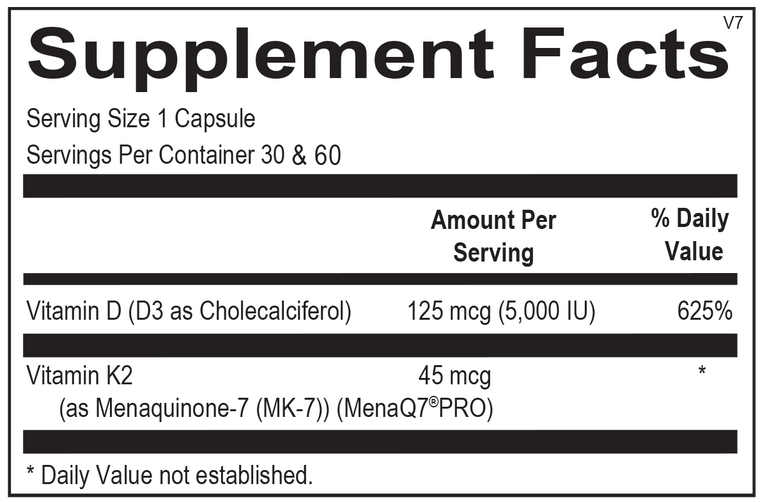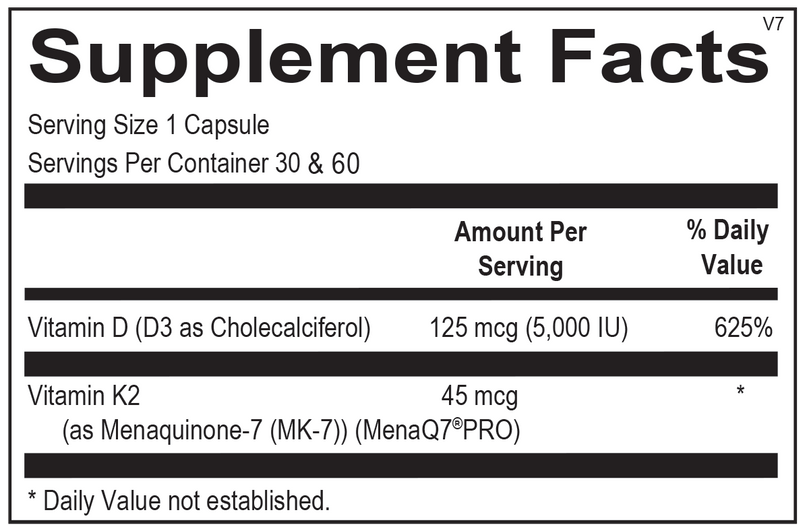


Clinical Applications
- Supports Healthy Blood Circulation
- Promotes Bone Health and Proper Calcium Storage
- Maintains Healthy Cardiometabolic Function and Supports Blood Sugar Balance Already Within Normal Levels
- Boosts Immune Function
New research is focusing on the synergistic relationship between vitamin K2 and vitamin D3, for bone and cardiovascular health. A group of naturally occurring and structurally similar, fat-soluble vitamins, vitamin K is essential for the proper utilization of calcium. Through its activation of the protein osteocalcin, vitamin K helps to bind newly absorbed calcium to the mineral matrix in bone. In addition, vitamin K has been found to help maintain bone mineral density by decreasing the activity of osteoclasts, a cell that breaks down the bone matrix. Vitamin K also provides critical cardiovascular protection by helping to activate matrix Gla protein (MGP), an inhibitor of circulatory calcification. Thus, vitamin K and vitamin D not only share similar qualities, but they also act synergistically within the body.
The addition of MenaQ7® PRO to this formula is backed by extensive research. Dr. Leon Schurgers, world-renowned expert in vitamin K2 as MK-7 research for cardiovascular and bone health, and his team of research scientists have conducted over 15 clinical trials on MenaQ7® PRO through the University of Maastricht.
Vitamin K2 with D3 includes 45 mcg of MenaQ7® PRO, the most widely studied form of vitamin K2 as MK-7, and 5,000 IU of vitamin D3 per capsule for optimal absorption and use by the body.
Suggested Use:
1 or more capsules per day or as recommended by your health care professional.
Vitamin K Depletion
Although most people consume adequate dietary vitamin K to maintain sufficient blood clotting, most do not consume enough to meet cardiovascular and bone health needs. In fact, approximately 70% of the western population is deficient in vitamin K2. Compromised intestinal absorption can also lead to insufficient K2 levels leaving calcium available to be exported out of bone and into other tissues. Other medications such as antibiotics, cholesterol-lowering medications and laxatives have also been found to contribute to a deficiency of vitamin K.
Bone Health
Building and maintaining healthy bones requires a number of key nutrients including vitamin K, for the proper binding of calcium to the bone matrix.
Cardiovascular Health and Blood Sugar Balance
Vitamin K plays a key role in supporting the cardiovascular system as well as blood sugar balance already within normal levels. Studies have also shown vitamin K supports healthy blood sugar metabolism.
Immune Modulation
New evidence also suggests vitamin K plays a central role in balancing immune health. Recent studies have shown that both vitamins D and K impart immune-modulating effects.
Triage Theory
The Triage Theory states that in the face of nutrient inadequacies, nature ensures short term survival of a cell is protected at the expense of long-term consequences. Vitamin K is an excellent example of this theory. Hypothetically, a short term deficiency in vitamin K would lead to a reduction in blood clotting. This direct threat to survival does not happen, as the body uses its metabolic reserve of vitamin K to ensure immediate needs are met. If continued, this could begin to impact long-term reserves of vitamin K, reserves which are vital for the maintenance of proper bone strength and arterial elasticity. These issues are related to a loss of vitamin K-dependent proteins not required for short-term survival, nevertheless presenting long-term health challenges.



